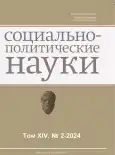Orthodoxy in the Perspective of the Formation of Compliance Between Secular and Church Academicism in the First Quarter of the 19th Century (Based on Materials from the National Corpus of the Russian Language)
- Authors: Markova N.M.1, Arinin E.I.1, Golenko V.V.1
-
Affiliations:
- Vladimir State University named after Alexander and Nikolay Stoletovs
- Issue: Vol 14, No 2 (2024)
- Pages: 222-230
- Section: Philosophical anthropology, philosophy of culture
- URL: https://bakhtiniada.ru/2223-0092/article/view/258484
- EDN: https://elibrary.ru/IBWKXL
- ID: 258484
Cite item
Abstract
The first quarter of the 19th century became an era of rapid geopolitical changes, and the number of texts with the lexeme “Orthodoxy”, according to the materials of the linguistic academic resource “National Corpus of the Russian Language”, was almost equal to their volume for the entire 18th century. The formation of an academic tradition of respectful and objective description of confessional, ethnic, ethno-confessional and religious communities in a multi-confessional country of the Enlightenment continues, while Orthodox, Catholics and Protestants could be understood as “members of a single Christian people” (Act of the Holy Alliance, 1815). In search of compensation (harmony) between secular and church elites, new denotations and connotations are formed (for example, “Parnassian Orthodoxy” by A.S. Pushkin), and the normative Cyrillic spelling of the “Russian faith” that is familiar today is unified. The article outlines the position and approaches of modern philosophical religious studies.
Full Text
##article.viewOnOriginalSite##About the authors
Natalia M. Markova
Vladimir State University named after Alexander and Nikolay Stoletovs
Author for correspondence.
Email: natmarkova@list.ru
Scopus Author ID: 57209426026
Cand. Sci. (Philos.), Associate Professor, Department of Philosophy and Religious Studies
Russian Federation, VladimirEvgeny I. Arinin
Vladimir State University named after Alexander and Nikolay Stoletovs
Email: eiarinin@mail.ru
Scopus Author ID: 37060239800
Dr. Sci. (Philos.), Professor; Head, Department of Philosophy and Religious Studies
Russian Federation, VladimirVladimir V. Golenko
Vladimir State University named after Alexander and Nikolay Stoletovs
Email: volodimir.golenko@mail.ru
PhD Student, Department of Philosophy and Religious Studies
Russian Federation, VladimirReferences
- Fowler W. Warde. The Latin history of the word “Religio”. In: Transactions of the third international congress for the History of Religions. Vol. II. Oxford: Clarendon press, 1908. Pp. 169–175.
- Fowler W. Warde. The original meaning of the word “Sacer”. In: Roman essays and interpretations. Oxford: The Clarendon press, 1920. Pp. 7–15.
- Arinin E.I., Bendin A.Yu. Traditions of religious tolerance and tolerant attitudes of youth: Images of the “Other” and “Alien”. Humanitarian Gazette of the TSPU named after L.N. Tolstoy. 2020. No. 3. Pp. 13–26. (In Rus.)
- Arinin E.I., Lyutaeva M.S., Markova N.M. Autopoiesis of religion as a social subsystem: Reception of N. Luhmann’s ideas by Russian researchers of religion. Religious Studies. 2022. No. 1. Pp. 72–81. (In Rus.)
- Gaida F.A. “Orthodoxy” in the triad of S.S. Uvarov. Bulletin of the Orthodox St. Tikhon’s University for the Humanities. Series 2: History. History of the Russian Orthodox Church. 2021. Vol. 100. Pp. 32–46. (In Rus.)
- Herodotus. History in nine books. Leningrad: Nauka, 1972. 600 p.
- Herodotus. History in nine books. Vol. 1. Moscow: Publishing house of A.G. Kuznetsova. Printing house of E.G. Potapova, 1888. 396 p.
- Golenko V.V. Ideas about Orthodoxy in Russian literature of the second half of the 18th century (based on materials from the NKR). In: Religion, science and theology: Challenges and problems of our time. Vladimir: VlGU Publishing House, 2023. Vol. 39. Pp. 38–43.
- Golovnev A.V. Ethnography in the Russian academic tradition. Ethnography. 2018. No. 1. Pp. 6–39. (In Rus.)
- Golovnev A.V. Kisser T.S. Indigenous peoples: perspectives and statuses. Ethnography. 2022. No. 3 (17). Pp. 6–32. (In Rus.)
- Konovalova M.V. Use of the term “evocation” in foreign and domestic science. Philology and Man. 2016. No. 3. Pp. 19–28. (In Rus.)
- Lipich V.V. Dialogue of classicism and romanticism in the early works of A.S. Pushkin (to the problem of the formation of the writer’s artistic method). Scientific Gazette of BelSU. Series: Humanities. 2010. No. 12 (83). Issue 6. Pp. 31–40. (In Rus.)
- Luhmann N. Differentiation. Moscow: Logos, 2006. 320 p.
- Markova N.M., Arinin E.I., Golenko V.V. Orthodoxy as an extralinguistic phenomenon and the paradoxes of finding compliance with its linguistic images in publications of the 18th century (based on the materials of the National Corpus of the Russian Language). Sociopolitical Sciences. 2024. Vol. 14. No. 1. Pp. 122–131. (In Rus.)
- Matveev A.K. Onomastics and onomatology: terminological study. Questions of Onomastics. 2005. No. 2. Pp. 5–10. (In Rus.)
- Takahashi S., Arinin E.I., Pogodina I.V. Intercultural communication in the sphere of confessional and legal relations (moments of the general and special in Russia and Japan). Concept: Philosophy, Religion, Culture. 2021. Vol. 5. No. 4. Pp. 158–171. (In Rus.)
- Shakhnovich M.M. Essays on the history of religious studies. St. Petersburg: St. Petersburg University, 2006. 290 p.
- Shokhin V.K. Philosophy of religion and its historical forms (antiquity – end of the 18th century). Moscow: Alfa-M; Institute of Philosophy of the Russian Academy of Sciences, 2010. 784 p.
Supplementary files








